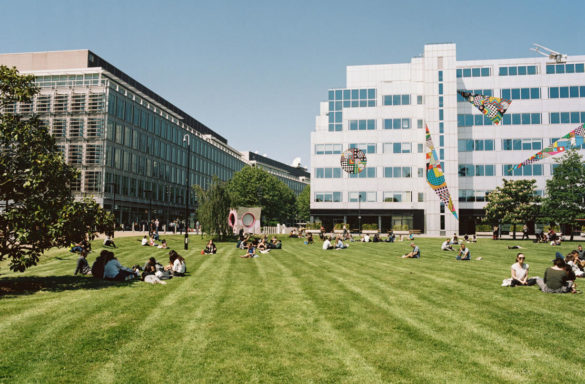ARTICLE
Returning to the Workplace: Mandate or Choice?
2:45:20 29 March 2022
37°48’51”S 144°57’47”E
As government restrictions ease, organisations are looking at ways to reignite the workplace. We’re seeing pubs and restaurants buzzing with people once again, yet most corporate workplaces are sitting near empty.
Whilst this isn’t a question of employees working from home vs. in the office, there are undeniable benefits of employees being physically together – increased innovation, reconciled community and culture, alignment to brand and purpose, development opportunities, equitable wellbeing and so on. This begs the question: How do organisations reconnect people with the workplace in a way that is fundamentally different to the pre-pandemic status quo?
In response, we’re seeing the introduction of all sorts of ‘work perks’, including free food and novelties in a quest to lure staff back and drive the resumption of face-to-face working. One such business is Deliveroo, which has mandated that staff spend three days a week in the office and has made a big fanfare of its free breakfasts, massage therapists and smoothie bikes. While this may have worked pre-pandemic, people’s priorities have changed. Australia’s CBD occupancy rates remain low, with Melbourne and Sydney achieving a paltry 15 and 18 per cent respectively (Property Council of Australia, office occupancy survey, Feb 2022). The workforce is more empowered than ever before: employees expect more.
Traditionally, a workplace served two key purposes for the business – support the effectiveness of work whilst also making efficient use of space. The success of a workplace was dependent on how well it supported productivity and how well organisations were able to optimise their space usage. With today’s ‘unleashed workforce’, these considerations have diminished, leaving a big question mark around the new role of the workplace.
The period of the pandemic has been a time of reflection. The significance of frontline workers and the work they do has made people question their own roles in society and their contributions to the greater good. Extended lockdowns have left people reassessing what’s truly important to them. Remote working has allowed people to repurpose time spent commuting and most have found joy in the flexibility of working from home – so much so that many workers would now rather leave their job than be forced to withstand long commutes and prescriptive 9 to 5 working hours.
Consequently, leaders are aware that mandating a return to the office only poses a threat to their staff retention. Flexibility has become the second most important consideration amongst employees after compensation, with 70% of employees saying the number of days should not be mandated (Bendelta, survey of 1000 workers, Feb 2022). Employees must return to the office out of their own desire to do so, but if the previous roles of the office (effectiveness and efficiency) are no longer dependent on the physical office space, why would people bother coming in? Certainly not for free donuts and back massages, which though welcome, hardly constitute a fundamental shift in the culture and activation of the workplace.
One thing is clear: the importance of the workplace as a place of experience will only increase as meaning and purpose become central to people’s work, job choice, and career path.
This being the case, organisations need to express what they stand for. They need to create clear narratives and experiences that genuinely connect employees with their personal goals and sense of purpose.
Whilst work perks may provide a short-term fix to attraction, they set unrealistic expectations, nor do they speak to the diverse psychographics and preferences that modern workforces are comprised of. Instead, organisations must think about how their relatively short-term return to work strategies and tactics can become a thread that is connected to a more powerful story. For example, if an organisation wants to put on free food, why not partner with sustainable and locally sourced food providers. If organisations want to host Friday night drinks to increase end of week foot traffic, why not bring in a local band and show support for an industry we know is struggling off the back of the pandemic. This way, everyone can appreciate the intent of the action, regardless of whether it speaks to them directly.
The new role of the workplace is one of organisational expression. A programme of experiences that support expression of purpose and demonstrate responsible investment. In turn, this will create a genuine sense of belonging and advocacy. It’s not about bringing people back, it’s about being a better organisation – one so attractive as to give its employees a genuine choice between work and home. It’s about creating a workplace that can’t be created at home.
Hero Image: Caleb Fisher
Teaser Image: Shaun Low



